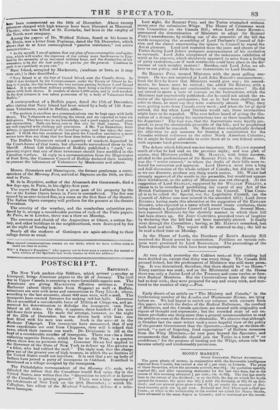Last night, Sir ROBERT PEEL and the Tories triumphed without
mercy over the submissive Whigs. The House of Commons went into Committee on the Canada Bill ; when Lord JOHN RUSSELL announced the determination of Ministers to adopt Sir ROBERT PEEL'S amendments, by striking out of the preamble of the bill the words recognizing the assembling of Lord Durham's Council of Ad- vice, and the clause empowering the Queen in Council to repeal the Act at pleasure. Loud and repeated were the jeers and cheers of the Tories during Lord John's pompous announcement of his resolution to succumb. Lord John complained of the indecorous exhibition of mirth at his expense, which absolutely appeared to arise from a feeling of party exultation,—as if such sentiments could have place in the dis- cussion of such weighty matters ! Besides, said Lord John, we ad- here to our policy, and abide by our instructions to Lord Durham.
Sir ROBERT PEEL treated 'Ministers with the most galling con- tempt. He was not surprised at Lord John Russell's announcement: from the first he knew that Ministers would give way ; his amend- ments, be knew, must be carried ; for, added Sir ROBERT, with a bitter sneer, were they not conformable to common sense? He did not intend to move a vote of censure on the Instructions, which the Ministers had imprudently published—for he could not attack the ex- ercise of the Queen's prerogative; but as he had been challenged to refer to them, he must say they were eminently absurd. Why, they were getting news from Canada every week ; and when the 1st of April arrived, the day when Lord Durham would sail, those instructions might have to be repealed. Who ever before heard of giving the Go- vernor of a distant colony his instructions two or three months before his departure? The fact was, that the Instructions were hastily pre- pared, to prop the abominable preamble of the bill; and he prophesied that they would be repealed. Sir ROBERT then emphatically declared his objection to any measure for framing a constitution for the Canadas without reference to the other North American Colonies ; for it might be found advisable to unite them all in one federal union, with separate local governments.
The debate which followed was not important. Mr. ELLICE repeated much of what he had said on the previous night ; and was glad, of course, that Ministers yielded. Mr. HARVEY, with bitter sarcasm, alluded to the predominance of Sir ROBERT PEEL in the House. He was the "senior counsel," to whom the drafts of their bills were re- ferred for correction and approval. Lord Homo( went into a long and dull discussion of the whole subject of Canada ; but did not, as far as we can discover, produce any thing worth notice. Mr. WARD had strongly approved of the words in the preamble, but would not oppose their withdrawal, as the policy of Ministers was not changed, At the suggestion of Lord STANLEY, supported by Sir WILLIAM FOLLETT, a clause is to be introduced prohibiting the repeal of any Act of the British Parliament by Lord Durham and his Council. That Coun- cil is to be called the Special, not the Legislative Council, (as the Council of Advice was now termed in the amended bill); Lord Jowly RUSSELL having made this alteration at the suggestion of Sir EDWARD SUGDEN, who objected to a name which would create confusion, there being already a Legislative Council of Lower Canada. Several Mem- bers reproved Ministers for the slovenly manner in which their bill had been drawn up. Sir JOHN CAMPBELL provoked roars of laughter by declaring that the bill had not been materially altered. It finally went through the Committee ; having, as Mr. HARVEY remarked, lost both head and tail. The report will be received to-day; the bill to be read a third time on Monday.
In the House of Lords, the Dutchess of Kent's Annuity Bill received the Royal assent by commission. Petitions on various sub- jects were presented by Lord BROUGHAM. The proceedings of the Peers throughout the week have been unimportant.


























 Previous page
Previous page